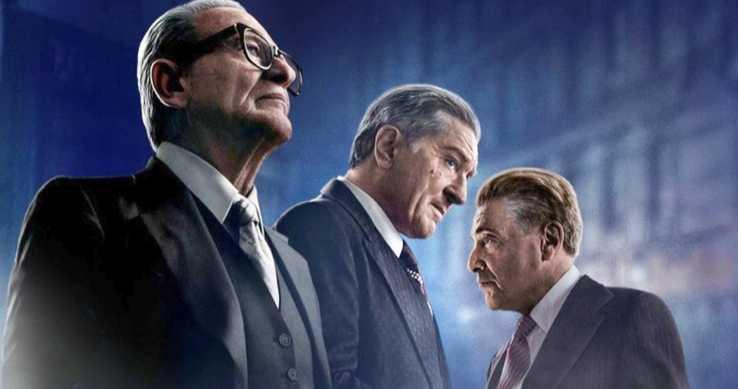"The Irishman:" An Ozymandian Tale of Blood and Betrayal
Gallery

Martin Scorsese’s “The Irishman” opens in a setting one wouldn’t typically associate with a mob film. We watch as a caretaker strolls a sickly old man in a wheelchair in a nursing home, passing by dozens of other elderly patients, most of them looking lost and aimless. The old man is played by an unrecognizable Robert DeNiro. But, instead of innocent memories of childhood and family, we get a bloody recollection of mob hits, corruption, political scandals, and betrayal.
DeNiro plays Frank Sheeran, an Irish-American truck driver who, through various coincidences, slowly finds himself integrating into the Bufalino crime family, a mafia syndicate led by the cold and calculating Russell Bufalino (played by the brilliant Joe Pesci). Russell is quickly impressed by Frank’s loyalty to the mob and begins to employ him on various odd jobs throughout Pennsylvania, usually resulting in dead bodies. Having proved his worth, Russell soon introduces Frank to Jimmy Hoffa (played by Al Pacino), the head of the International Brotherhood of Teamsters, a labor union that has financial ties to the Bufalino crime family. Jimmy struggles to deal with fellow Teamster and crime boss Tony Provenzano (played by Stephen Graham), who seeks to dethrone Hoffa, as well as criminal investigations from the federal government. Sheeran becomes Hoffa’s bodyguard and confidant, and they quickly form a brotherly bond that soon becomes violently tested.
“The Irishman” on paper is a movie that seems too good to be true. Some of Hollywood’s heaviest hitters, DeNiro, Pacino, Pesci, and Scorsese behind the camera, present an opportunity that feels rare in this current cinematic age of remakes and bloated film franchises. DeNiro’s performance is one of his best, as he shows considerable restraint portraying the quiet and sullen nature of Sheeran. His silent, oftentimes melancholic expressions speak much louder than any line of dialogue. Pacino on the other hand shows no restraint as the loud and boisterous Hoffa, a character who will unleash a tirade over the most miniscule of issues, such as arriving to a meeting a few minutes late.
Many potential viewers may be intimidated by the three hour and thirty minute runtime, but the film is so beautifully directed that it’s hard to even notice. Cameras swoon over gunfire and canvases of violence while more nuanced scenes flow with quiet expression and purpose. The editing, done by the incredible Thelma Schoonmaker, whose Oscar winning work on “Raging Bull” and “Goodfellas” has been regarded by critics as some of the best film editing of all time, is so seamless in its transitions, so flawless in its cuts, musical cues, and stylistic flares, that it’s no wonder Scorsese has collaborated with her on almost all of his films.
Throughout all the raw talent presented on screen, what really shines is the script by Steven Zaillian. We find ourselves in a time in which the film legends of today have reached an age that cements them as icons of an earlier cinematic era. In a way, “The Irishman” could be seen as Zaillian’s ode to the passing of time, a metaphor for the realization that the actors and filmmakers of yesteryear who are now celebrated as idols are reaching a physical age that may soon prohibit them from working. As the film progresses, we see the deterioration of Frank and his mob accomplices. Every wrinkle he grows, every grey hair, every past regret, we feel as he and the crew grow older and older, becoming lonely, muttering shells of their former selves. It’s a stylistic change for Scorsese, as most of his mob related films end with a bang, not a whimper. Though it is this somber meditation that makes the film all the more enthralling and heartbreaking.
As I was watching the film, Percy Shelley’s poem “Ozymandias” came to mind. In the poem, a traveller finds a large, crumbled statue of an ancient king named Ozymandias in the desert. “Look on my works, ye mighty, and despair!” is written on the statue’s pedestal. The traveller looks around and finds nothing but ruins and rubble buried beneath the vast sands. Thankfully, unlike Ozymandias, Sheeran, and Bufalino, Martin Scorsese and his wonderful team of Hollywood icons have something to show for their many years of hard work.
MPAA Rating: R for pervasive language and strong violence.
